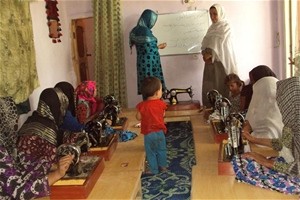
The training enables women in Kunduz to connect with government services.
USAID/CBSG
Tailor training connects women to Afghan government services
15 DECEMBER 2011 | KUNDUZ, AFGHANISTAN
More than 350 women in Chara Dara District received training, equipment, and materials that enabled them to open tailoring businesses and take advantage of social services at the district level.
Years of civil war and internal conflict had left Afghan women’s voices unheard, depriving them of their fundamental right to education and training. Women in communities were disconnected from each other and government provided services.
The Women’s Welfare Association in Kunduz Province provides support and assistance to a large number of widows and economically disadvantaged women. As a means of increasing the capacity of an underserved community and connecting them with local Afghan government representation, the association requested funding for tailoring training from USAID.
In coordination with the Provincial Line Department of Women’s Affairs, the communities designed and implemented the training to provide income-generating opportunities and create linkages between women in the community and their local government. Between April and September 2011, women were trained in Chara Dara District and the district center. The trainees received equipment and materials, including cloth, sewing tables, sewing machines, irons, ironing boards, and scissors.
Sharifa, the head of Women’s Shura, stated that the project was vital to the empowerment of women of Kunduz Province. She highlighted the importance of the project in connecting women with their local government and added that the project had enabled the women to open tailoring businesses and take advantage of social services at the district level.
Naseema, one of the training participants, explained that high unemployment was one of the many challenges facing women in the community. Because many men in the region are disabled or chronically unemployed, women had to work to help the household with the expenses, but lacked the necessary skills to run a business. Following the training, she said, “Now that we have gained the required skills in tailoring and received the necessary equipment, we are able to open our own businesses and generate income from sewing clothes.”







Comment
Make a general inquiry or suggest an improvement.